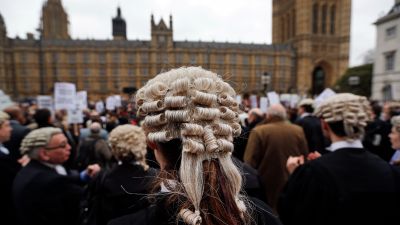Some crown court trials to be postponed as criminal barristers vote to strike over funding

Many crown court trials will likely be postponed after criminal barristers in England and Wales voted in favour of plans to strike following a long-running dispute with the government over legal aid fees.
The Criminal Bar Association (CBA), which represents barristers in England and Wales, said court walk outs will go ahead from June 27, after 2,055 votes were cast by its members.
The strike action, which stems from an unresolved row with the government over funding, is intended to last for four weeks, increasing by one day each week until a five-day strike from July 18 to July 22.
Barristers are expected to strike on picket lines outside court, including at The Old Bailey in London and at crown courts in Birmingham, Bristol, Cardiff, Leeds and Manchester.
Jo Sidhu QC and Kirsty Brimelow QC from the CBA said: “This extraordinary commitment to the democratic process reflects a recognition amongst criminal barristers at all levels of call and across all Circuits that what is at stake is the survival of a profession of specialist criminal advocates and of the criminal justice system which depends so critically upon their labour. “Without immediate action to halt the exodus of criminal barristers from our ranks, the record backlog that has crippled our courts will continue to inflict misery upon victims and defendants alike, and the public will be betrayed.”
The promised industrial action, voted in favour of by 81.5% of those balloted, comes at a time of significant delays within the justice system.
The most recent figures from HM Courts and Tribunals Service show there were 358,076 outstanding cases at magistrates’ courts, and 58,271 outstanding cases at crown courts, as of April 2022.
The delays vary widely depending on the crime - with victims of rape and other serious sexual offences waiting the longest for prosecutions to be completed.
Criminal barristers are the latest group to go on strike, ahead of planned action by rail workers later this week, and amid reports of unrest among teaching staff and NHS employees.
Care workers, civil servants and refuse collectors are also among those that may ballot for strikes in the months ahead.
Why are barristers striking?
Barristers are self-employed and instructed by solicitors to provide advocacy or advice for people being prosecuted in cases brought before the UK's criminal courts.
The CBA have said underfunding of the criminal justice system has led to an "alarming exodus" of criminal barristers, with the system teetering on the brink of collapse.
It has accused ministers of dragging their feet over implementing a 15% rise in rates for legal aid - as recommended by an independent review.
"In responding to the recommendations of the Independent Review of Criminal Legal Aid [CLAR], government has manifestly failed to recognise the scale of the crisis and to act with the urgency required," the CBA said.
In April, the CBA started to refuse to carry out “return work” – stepping in and picking up court hearings and other work for colleagues whose cases are overrunning – which is described as a gesture of goodwill to prop up the justice system. The CBA said it also made “repeated efforts” to persuade the government to honour the recommendations of the Criminal Legal Aid Review to increase their fees by 15% immediately, but have been disappointed.
Justice Minister James Cartlidge has encouraged the CBA to work with the government, saying that an escalation to "unnecessary strike action" would only serve to harm victims forced to wait even longer for justice. “This is a disappointing decision by the Criminal Bar Association, considering less than 50% of CBA members voted in support of the option likely to cause the most disruption," he said.
"The 15% pay increase we consulted on would mean a typical criminal barrister earning around £7,000 extra per year and only last week I confirmed we are moving as quickly as possible to introduce fee rises by the end of September."